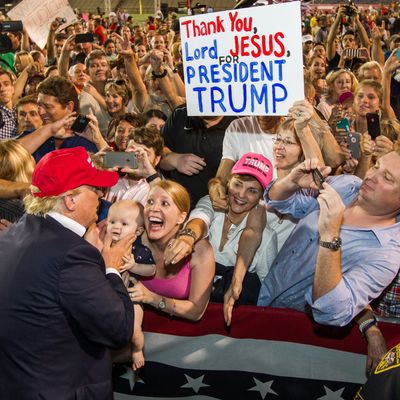
In the rush of events since November 8, it is hard to get an overall handle on what Donald Trump’s America is going to be like (other than Great Again, of course). But the much ballyhooed intervention by the president-elect and vice-president-elect to convince a particular company to keep particular jobs in a particular place triggered something very familiar in the back of my mind. And it finally hit me: Trump is acting like the governor of a backward southern state, chasing smokestacks with inducements and threats and a generally small-bore approach that treats economic development as a deal-making enterprise with public resources used as chips.
As a Georgian who spent some years working in community and economic development, once the thought occurred to me, Trump’s behavior struck me as entirely predictable. In places that don’t have a whole lot going for them to create new jobs or attract investors, public officials (especially governors) spend a lot of time pretending they personally have a big brawling, deal-making effect on decisions to keep or retain jobs. Because their individual efforts are vastly more tangible than the thousands of public policies that affect the viability of a state or locality, they get away with taking credit for private-investment decisions. And the investors involved are always happy to go along with the game in exchange for tax or infrastructure or regulatory concessions. While this is a bipartisan habit in the South and elsewhere, southern Republicans are especially eager to treat public resources from school revenues to labor and environmental regulations as expendable if giving them up creates a ground-breaking or ribbon-cutting opportunity. Everything about the Carrier case smells like that sort of scam.
And the more you think through other likely aspects of the Trump administration, they could have a certain L.A. (as in Lower Alabama) flavor as well. There is the Trump campaign’s commitment to a definition of “religious liberty” that means a large-scale abandonment of church-state separation principles that have never much been accepted in the Bible Belt. There is the deep, systemic hostility to labor unions you see in the people Trump is considering for Labor secretary or the National Labor Relations Board. There’s the rejection of climate-change theories that southern conservatives never much cottoned to, accustomed as they are to thinking of the Earth as a time-limited exploitation opportunity granted by God. And there’s a disdain for progressive taxation that once led Alabama’s white voters to overwhelmingly reject an initiative backed by its Republican governor that would have made the nation’s most regressive income tax slightly less burdensome to poor people.
But to a considerable extent the resemblance of the Trump administration to a middling state administration in Alabama may depend on the Alabaman who has been appointed to a crucial position: Attorney General–designee Jeff Sessions.
It is Sessions who will decide whether the U.S. Department of Justice abandons all interest in voting-rights cases and instead hunts down the will-o-the-wisp of voter fraud for prosecution. That would be a very Alabama thing to do, unfortunately.
It is Sessions who will likely place the power and influence of the Department of Justice against the bipartisan movement for criminal-justice reform that has gotten so tantalizingly close to success in the last few years. That, too, would be a very Alabama thing to do when you remember how often over the last half-century (right up until the present) federal judges have had to intervene to ensure humane treatment of the state’s prison population.
It is Sessions who will (in conjunction with his counterpart at the Department of Homeland Security) decide how aggressively to pursue deportation of undocumented immigrants. If he is as aggressive as his rhetoric in the Senate has long suggested, it will be another Alabama thing, since the state was a real pioneer in encouraging “self-deportation” by making life as randomly miserable as possible to people who might be here illegally.
And it is Sessions who will likely determine whether his customary states’-rights rhetoric is abandoned when it comes to tolerating legal marijuana, which he considers an abomination with all the zeal of an old-school soldier in the War on Drugs.
If Sessions goes heavily reactionary on all of these issues and Trump lets him, then the idea that the Trump administration represents some sort of innovative new “populist” ideology will be a bigger joke than ever. We could be looking at a regime with its heart in Dixie, and its head in the mid-20th century. And it will have nuclear weapons.






























